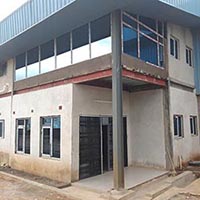To what extent is there still a (knowledge) network around legumes and nitrogen fixation active in your country?
| There is huge networking around legumes and nitrogen fixation in Malawi. Apart from the well-established projects funded by multinational donors (such USAID, GIZ among others), the tobacco industry (being the biggest farming industry in Malawi) started diversifying into legumes and have helped their farmers to access improved legume seed and locally produced inoculant, Nitrofix by AISL. |
Entrance of the new AISL laboratory near completion |
To what extent are private sector and/or NGOs still selling/ using / promoting “N2Africa technologies”? Can farmers readily access seeds, inoculants, legume-specific fertilizers?
The private sector led by Agro-Input Suppliers Limited (AISL) is actively involved in production and selling large volumes of soyabean and groundnut seed inoculant. One notable initiative by Feed the Future (The U.S Government’s Global Hunger and Food Security Initiative) has been floating adverts in the local newspapers with the caption ‘Use INOCULANT! For increased Legume Production’ (See also N2Africa Podcaster 54). Farmers can readily access legume seeds through various seed companies and agro-dealer networks spread across the country. The only challenge which some farmers cite is the cost of the seed. One major local fertilizer company – Malawi Fertilizer Company started blending and distributing legume-specific fertilizers.
Are there any interesting new developments taking place around legumes and nitrogen fixation?
Large tobacco buying companies in Malawi are supporting their outgrower farmers to grow legumes (mostly soyabean and groundnuts) as a way of diversifying their agro-enterprise.
Lloyd Phiphira, Country Coordinator Malawi

